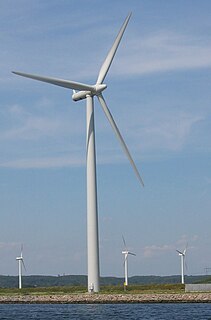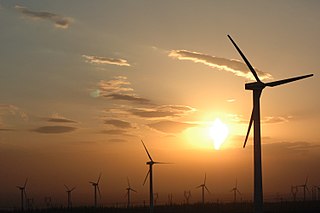
The Kyoto Protocol was an international treaty which extended the 1992 United Nations Framework Convention on Climate Change (UNFCCC) that commits state parties to reduce greenhouse gas emissions, based on the scientific consensus that (part one) global warming is occurring and (part two) that human-made CO2 emissions are driving it. The Kyoto Protocol was adopted in Kyoto, Japan, on 11 December 1997 and entered into force on 16 February 2005. There were 192 parties (Canada withdrew from the protocol, effective December 2012) to the Protocol in 2020.
Environmental finance is a field within finance that employs market-based environmental policy instruments to improve the ecological impact of investment strategies. The primary objective of environmental finance is to regress the negative impacts of climate change through pricing and trading schemes. The field of environmental finance was established in response to the poor management of economic crises by government bodies globally. Environmental finance aims to reallocate a businesses resources to improve the sustainability of investments whilst also retaining profit margins.
A carbon credit is a generic term for any tradable certificate or permit representing the right to emit a set amount of carbon dioxide or the equivalent amount of a different greenhouse gas (tCO2e).
The Clean Development Mechanism (CDM) is a United Nations-run carbon offset scheme allowing countries to fund greenhouse gas emissions-reducing projects in other countries and claim the saved emissions as part of their own efforts to meet international emissions targets. It is one of the three Flexible Mechanisms defined in the Kyoto Protocol. The CDM, defined in Article 12 of the Protocol, was intended to meet two objectives: (1) to assist non-Annex I countries achieve sustainable development and reduce their carbon footprints; and (2) to assist Annex I countries in achieving compliance with their emissions reduction commitments.

A carbon offset is a reduction or removal of emissions of carbon dioxide or other greenhouse gases made in order to compensate for emissions made elsewhere. Offsets are measured in tonnes of carbon dioxide-equivalent (CO2e). One ton of carbon offset represents the reduction or removal of one ton of carbon dioxide or its equivalent in other greenhouse gases. Offsets are viewed as an important policy tool to maintain stable economies and to improve sustainability. One of the hidden dangers of climate change policy is unequal prices of carbon in the economy, which can cause economic collateral damage if production flows to regions or industries that have a lower price of carbon—unless carbon can be purchased from that area, which offsets effectively permit, equalizing the price.

Improved cook stoves (ICS) are biomass stoves that are intended to replace traditional cook stoves and open fires, in the context of energy poverty and cooking. As of 2020, more than 2.6 billion people in developing countries lack access to clean, modern fuel and technologies for cooking, and therefore rely on burning polluting fuels such as wood, animal dung, coal, or kerosene for cooking.
Flexible mechanisms, also sometimes known as Flexibility Mechanisms or Kyoto Mechanisms, refers to emissions trading, the Clean Development Mechanism and Joint Implementation. These are mechanisms defined under the Kyoto Protocol intended to lower the overall costs of achieving its emissions targets. These mechanisms enable Parties to achieve emission reductions or to remove carbon from the atmosphere cost-effectively in other countries. While the cost of limiting emissions varies considerably from region to region, the benefit for the atmosphere is in principle the same, wherever the action is taken.

Household air pollution (HAP) is a significant form of indoor polluted air mostly relating to cooking and heating methods used in developing countries.

ClimateCare is a profit for purpose environmental and social impact company known for its role providing carbon offset services, with a particular focus on using carbon and other results based finance to support its 'Climate+Care Projects'. It also provides businesses and governments with sustainable development programmes, environmental and social impact measurement and project development.

Renewable energy in developing countries is an increasingly used alternative to fossil fuel energy, as these countries scale up their energy supplies and address energy poverty. Renewable energy technology was once seen as unaffordable for developing countries. However, since 2015, investment in non-hydro renewable energy has been higher in developing countries than in developed countries, and comprised 54% of global renewable energy investment in 2019. The International Energy Agency forecasts that renewable energy will provide the majority of energy supply growth through 2030 in Africa and Central and South America, and 42% of supply growth in China.
EcoSecurities is a company specialised in carbon markets and greenhouse gas (GHG) mitigation projects worldwide. EcoSecurities specialises in sourcing, developing and financing projects on renewable energy, energy efficiency, forestry and waste management with a positive environmental impact.
Reducing emissions from deforestation and forest degradation and the role of conservation, sustainable management of forests and enhancement of forest carbon stocks in developing countries (REDD+) was first negotiated under the United Nations Framework Convention on Climate Change (UNFCCC) in 2005, with the objective of mitigating climate change through reducing net emissions of greenhouse gases through enhanced forest management in developing countries. Most of the key REDD+ decisions were completed by 2013, with the final pieces of the rulebook finished in 2015.
Program of Activities (PoA) is a modality of project development under the Clean Development Mechanism (CDM) of the United Nations Framework Convention on Climate Change (UNFCCC).
The Adaptation Fund is an international fund that finances projects and programs aimed at helping developing countries to adapt to the harmful effects of climate change. It is set up under the Kyoto Protocol of the United Nations Framework Convention on Climate Change (UNFCCC).

Renat Heuberger is a pioneer in the field of sustainability and climate change. He is co-Founder and CEO of South Pole, a global climate finance leader that helps companies meet their net zero carbon emission targets. He has been engaged as a social entrepreneur in the fields of sustainability, climate change and renewable energies since 1999.

BioLite, a startup based in New York City founded in 2006, develops and manufactures off-grid energy products for both the outdoor recreational industry and emerging markets. The company is most well known for their flagship wood-burning stoves that use thermoelectric technology to produce usable electricity from the heat of their fires.
EcoZoom is a certified B Corporation that makes charcoal, wood and biomass cook stoves. The company has offices in Portland, Oregon and Nairobi, Kenya. EcoZoom holds the exclusive license to distribute stove technology designed by Aprovecho in developing countries and a second license to distribute in the United States.
InStove is a 501(c)(3) nonprofit organization established in 2012.
Atmosfair is an independent German non-profit organization which offers offsets for greenhouse gases emitted by aircraft, cruise ships, long-distance coaches, and events. The organization, founded in 2005, develops and finances small-scale energy efficiency and renewable energy projects in developing countries, which lead to reduced carbon emissions. Atmosfair has repeatedly won acclaim for operating with a high degree of transparency and accountability, as well as efficient use of funds.

CO2balance UK Ltd is a British profit-for-purpose carbon management consultancy and project developer founded in 2003. It is known for developing carbon finance projects in developing countries that reduce carbon emissions and support the Sustainable Development Goals. CO2balance also provides businesses and individuals with carbon footprint calculation and reduction services, bestowing the label of ‘CarbonZero’ on those organisations that completely offset the footprint of their operations.









